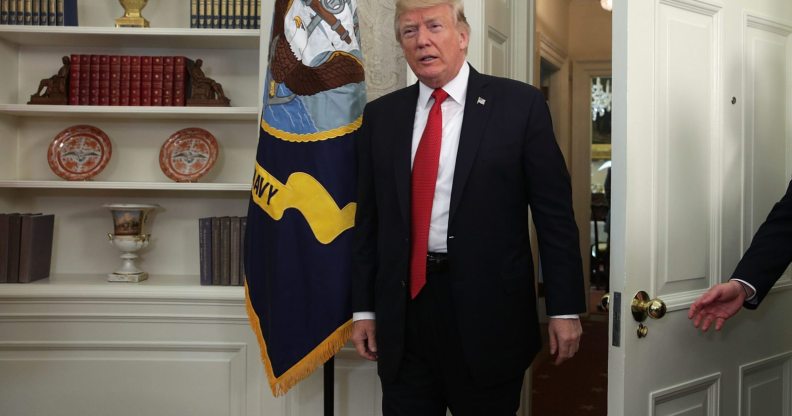Trump tells court to toss out lawsuit against transgender military ban

WASHINGTON, DC – OCTOBER 24: U.S. President Donald Trump enters the Oval Office for an event at the White House October 24, 2017 in Washington, DC. President Trump honored the eight winners of the National Minority Enterprise Development Week Awards Program during the Oval Office event. (Photo by Alex Wong/Getty Images)
The Trump administration has asked a court to toss out a lawsuit against the ban on transgender troops in the military.
President Trump abruptly announced on Twitter earlier this year that transgender people would be banned from serving in the military.
He claimed: “Our military must be focused on decisive and overwhelming victory and cannot be burdened with the tremendous medical costs and disruption that transgender in the military would entail.”
In the face of multiple civil rights lawsuits, Trump officials are pushing ahead with plans to block recruitment of any military personnel who identify as transgender and ‘purge’ existing soldiers from next year.
This week, the Trump administration filed a brief urging a court to toss out a legal challenge against the decision.
Trump’s Department of Justice filed a motion to dismiss and a motion opposing emergency relief in Stockman v. Trump, the transgender military ban suit filed on behalf of Equality California and transgender troops who could face harm from the ban.

(Photo by Spencer Platt/Getty Images)
Equality California, the National Center for Lesbian Rights (NCLR) and GLBTQ Legal Advocates & Defenders (GLAD) slammed the government’s response for ignoring the harms this dangerous policy is inflicting on our nation’s service members and transgender individuals who want to enlist but can’t.
“The government’s response is misguided, misinformed and just plain wrong,” said Rick Zbur, executive director of Equality California. “Transgender people don’t deserve to be told that what they are going through doesn’t matter or isn’t real. We should be honoring our troops. This ban and today’s response are a slap in the face.”
“The Trump administration has launched an unprecedented attack on thousands of dedicated service members,” said Shannon Minter, NCLR’s Legal Director.
“And today, the Department of Justice turned a blind eye to the devastation caused by this ban to our troops currently serving and to qualified, courageous transgender Americans who wish to enlist. Real people are suffering, and every day that goes by, the damage to service members and their families is more severe.”
“The Department of Justice has done it again,” said Jennifer Levi, Director of GLAD’s Transgender Rights Project.
“They refuse to acknowledge how much damage President Trump’s transgender military ban is doing, or the lives that have been thrown into chaos as a consequence of this reckless policy.
“We are hopeful that the Court will see that the law is stacked against the ban and grant emergency relief. There is no time to waste.”
The case was filed on behalf of three unnamed and four named plaintiffs.
The named plaintiffs include Nicolas Talbott from Lisbon, Ohio, a 23-year old who wants to enlist but is unable to do so because of the ban, and Aiden Stockman from Yucca Valley, California, a 20-year old who wants to join the Air Force and took the Armed Services Vocational Aptitude Battery (ASVAB) test in high school.
Aiden works at a grocery store that is shutting down and sees the Air Force as a promising career as well as a way to serve his country, but is unable to move forward because of the ban.
Tamasyn Reeves, 29, started the process to enlist in the military but has been unable to serve because of the ban. Jaquice Tate, 27, is an active-duty member of the Army, serving as a Sergeant, E-5 Rank.
The unnamed plaintiffs are all currently serving in the US Armed Forces.
The Justice Department filed a separate response on behalf of Trump in the United States District Court for the District of Columbia.
The 44-page brief calls for the court to dismiss a request for an immediate injunction against the ban.
Incredibly, the document cites court rulings in favour of Don’t Ask Don’t Tell – which banned gay people from the military – as precedent for banning trans people.
Implemented in the 1990s, Don’t Ask Don’t Tell survived a number of court challenges before it was repealed by lawmakers under President Obama
The brief cites it as case law, insisting: “Courts have upheld exclusionary policies in the military while at the same time invalidating similar policies in the civilian sphere.
“Of course, there are limits: no amount of deference could save the military’s decision to exclude a race or religion from being considered under the strict scrutiny standard.
“But outside those extreme examples, the military’s policies are entitled to a ‘healthy deference’ their civilian counterparts do not enjoy.”
The brief also argues that the President should have the “freedom [to decide] who may serve in the armed forces”.
It adds: “A variety of physical and mental conditions presumptively bar entry into the armed forces, including asthma, history of severe migraines, discrepancies in leg-length resulting in a limp, or any curvature of the spine that would prevent one from wearing a uniform properly.
“Reasonable people could disagree over whether these individuals should be able to serve. But that does not mean that the President or military leadership harbors animus towards these individuals.”

The lawsuit also claims that the President’s announcement that the government “will not accept or allow transgender individuals to serve in any capacity in the U.S. Military” was not actually an announcement of a new policy, despite it reversing the policy of the Obama administration.
It claims :”Plaintiffs cannot claim that the President imposed a new requirement; instead, he declined to relax longstanding policy without further study.
“All the President has done is preserve the status quo ‘until such time as a sufficient basis exists upon which to conclude’ that ending the
accessions policy would not result in harm to the military.
“The President has the authority to insist on further study before a significant change to military personnel policy, and Plaintiffs cannot show otherwise, let alone obtain an injunction to halt such study.
“And certainly no Plaintiff can credibly sustain a claim for emergency relief as to a policy whose current version has been in place without modification for nearly six years.”

Donald Trump and Attorney General Jeff Sessions (Photo by Shawn Thew-Pool/Getty Images)
Elsewhere it adds: “Because Plaintiffs lack standing and their claims are not ripe, the Court should not consider Plaintiffs’ motion for a preliminary injunction.
“The Court’s review of Plaintiffs’ preliminary injunction motion should begin and end with a consideration of whether they are likely to suffer irreparable injury.
“To show that a preliminary injunction is warranted, Plaintiffs must demonstrate ‘that irreparable injury is likely in the absence of an injunction’, regardless of the likelihood of success on the merits of their claims.
“They cannot do so.
“As Plaintiffs’ potential injuries are all employment-related, they could be remedied by the Court at a later date and are thus not irreparable.”
The brief continues: “To the extent Plaintiffs seek to attack the ongoing policy-making process, their claims similarly lack merit.
“The President’s decision that the complex issues presented by the policy on military service by transgender individuals warrant additional study before changes are made to longstanding policies passes constitutional muster under any standard.
“Even if the Court could somehow review the military’s current maintenance of its longstanding accessions policy, the policy would withstand constitutional challenge.
“Likewise, until the future policy concerning transgender service is resolved and implemented, Plaintiffs cannot show they are likely
to succeed on their due process or estoppel claims.”
A hearing is scheduled for November 20 in the United States District Court for the Central District of California.

